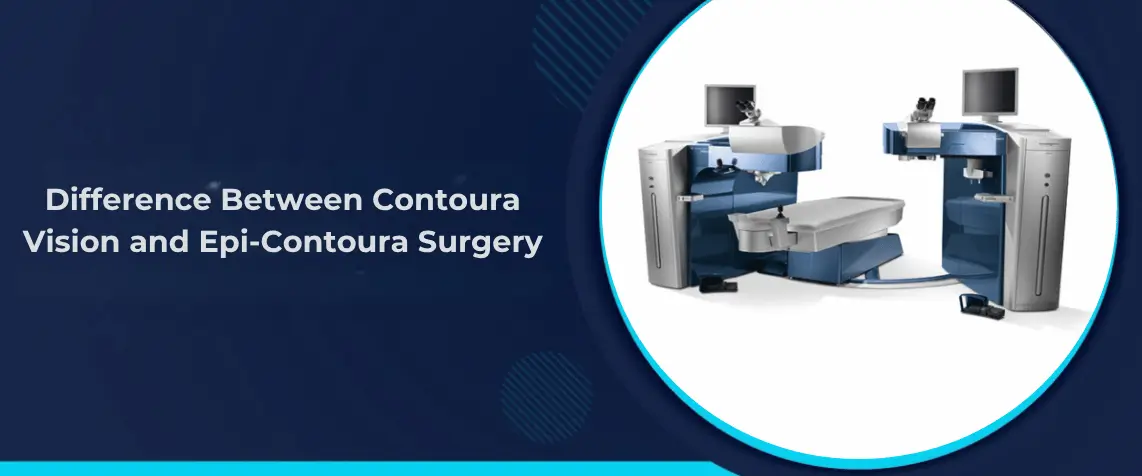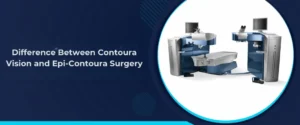Want to get rid of specs? Worry not! There is a host of advanced vision correction surgeries to choose from. Two popular names among these procedures are Contoura Vision and Epi-Contoura. The two might sound similar, but they are quite different from each other.
In this blog, we are going to shed light on the major differences between Contoura Vision and Epi-Contoura – so you can make an informed decision.
What is Contoura Vision Surgery?
A topography-guided procedure, Contoura Vision works according to the unique topography of your eye. This promotes precise vision correction according to your distinct corneal conditions. The procedure uses an advanced mapping technology to come up with a detailed corneal map. This helps the laser reshape your eye surface with perfection.
So, Contoura Vision surgery follows a customised approach to give you better visual outcomes and fewer side effects as compared to conventional LASIK surgery.
What is Epi-Contoura Surgery?
Epi-Contoura is an advanced flapless refractive surgery. It helps keep the corneal surface intact. The result is improved safety and smoother recovery since there is no risk of flap-related complications. The procedure involves detailed mapping of the corneal surface. The aim is to identify flaws unique to your eyes. Highly precise lasers are utilised to directly reshape the cornea by optimising how light falls on the retina. What you stand to gain is – sharper vision and negligible visual issues like halos and glare.
Contoura Vision vs Epi-Contoura
It is interesting to note that both procedures make use of topography-guided laser technology to give you sharp vision, yet there are some key differences between the two. Let’s have a look:
| Feature | Contoura Vision | Epi-Contoura |
| Surgical Approach | A thin corneal flap is created to target the laser on the tissue beneath the flap to repair refractive errors. | ‘No-flap’ technology. No cuts. The laser directly reshapes the corneal surface. Suitable for patients who want to avoid potential flap-related complications. |
| Corneal Integrity | Though highly effective, the corneal surface gets incisions, which could lead to potential flap issues. However, such complications are extremely rare. | Preserves the surface of the cornea, avoiding flap-related risks. |
| Recovery Duration | Faster recovery than Epi-Contoura. | Recovery faster than that in conventional LASIK. |
| Suitability | Patients interested in an advanced topography-guided LASIK surgery that gives excellent results. Those with proper corneal thickness. | Patients interested in a ‘no-flap’ procedure that comes with minimal risk and a smoother recovery. Ideal for individuals with thin corneas. |
| Complication Risk | Highly safe and effective, but may carry minor risk of flap-related complications. | No flap is created, so no flap-related risks. |
It is easy to see that Contoura Vision successfully gives you sharp vision along with reduced risk of glare and halos. However, Epi-Contoura is a ‘no-flap’ procedure, so you get excellent results along with no risk of flap-related complications. Also, it is suitable for individuals with thin corneas.
Benefits of Each Procedure
Contoura Vision Surgery Benefits
- Highly customised
- Par excellence visual results
- Tailored to your unique corneal attributes
- Reshapes deeper corneal layers for more precise results
- Fewer side effects than conventional laser eye surgeries
- Minimal risk of glare, halos, and night vision problems
- Patients report overall highly satisfactory outcomes
Epi-Contoura Surgery Benefits
- Topography-guided + saves epithelial tissue
- Improved accuracy
- No flap created
- Suitable for people with thin corneas
- Smoother recovery
- Better for individuals with an active lifestyle
Is Contoura Vision or Epi-Contoura Surgery Safe?
Both the vision correction surgeries – Contoura Vision and Epi-Contoura are US-FDA approved, which stands as proof of their safety. Both use advanced eye technology for precise vision correction, while keeping complication risk to a minimum. However, they must be performed by an experienced and trusted eye specialist.
Note: All surgeries carry some inherent risk. Make sure you talk to your eye doctor about the possible pros and cons of both in your particular case, before deciding to get either.
How to Select the Right Procedure for Your Vision Needs
Consider factors like your specific vision problems, eye health, corneal thickness, lifestyle, and personal preferences. Consult a well-qualified and experienced eye surgeon at the best eye hospital in Chandigarh to get insights pertaining to your unique circumstances.
Finally, you should make up your mind depending on an in-depth understanding of each surgery’s advantages and limitations, so that you can get the best possible vision clarity.
Final Words
Both Contoura Vision and Epi-Contoura are advanced specs-removal surgeries that give you crystal clear vision by correcting your refractive errors.
A knowledge of differences between the two procedures will enable you to make an informed and customised choice for your specific eye care needs.
Do get in touch with a reputed eye specialist to explore your options thoroughly and decide the best line of eye treatment for your vision clarity.
FAQs
1. What is the main difference between Epi-contoura and Contoura Vision?
While Epi-Contoura surgery does not involve the creation of a flap and treats the corneal surface, Contoura Vision is flap-based and works on the deeper corneal layers for more accurate outcomes.
2. How long does recovery take after each surgery?
With Epi-Contoura, you are likely to recover in 2-3 days, while Contoura Vision generally takes 1-2 days.
3. Can both procedures treat astigmatism?
Yes. Both Contoura Vision and Epi-Contoura treat astigmatism effectively.
4. Will I need glasses or contacts after surgery?
Most patients do not require any specs or contacts post-surgery. However, in rare cases, there may arise a need for minor corrections.
5. Is Epi-Contoura more effective for certain eye conditions?
If your cornea lacks adequate thickness for Contoura Vision or surface irregularities are present, Epi-Contoura may be more suitable for you.





